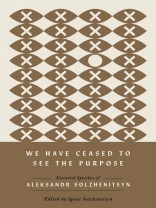This collection brings together ten of Nobel Prize–winner Aleksandr Solzhenitsyn’s most memorable and consequential speeches, delivered in the West and in Russia between 1972 and 1997.
Following his exile from the USSR in 1974, Aleksandr Solzhenitsyn lived and traveled in the West for twenty years before the fall of Communism allowed him to return home to Russia. The majority of the speeches collected in this volume straddle this period of exile, contemplating the materialism prevalent worldwide—forcibly imposed in the socialist East, freely chosen in the capitalist West—and searching for humanity’s possible paths forward. In beautiful yet haunting and prophetic prose, Solzhenitsyn explores the mysterious purpose of art, the two-edged nature of limitless freedom, the decline of faith in favor of legalistic secularism, and—perhaps most centrally—the power of literature, art, and culture to elevate the human spirit.
These annotated speeches, including his timeless ’Nobel Lecture’ and ’Harvard Address, ’ have been rendered in English by skilled translators, including Solzhenitsyn’s sons. The volume includes an introduction to the speeches, brief background information about each speech, and a timeline of the key dates in Solzhenitsyn’s life.
Innehållsförteckning
Translated From the Russian
Editor’s Note
Acknowledgments
“Not Everything Can Be Named” by Ignat Solzhenitsyn
1. Nobel Lecture
2. An Orbital Journey
3. If One Doesn’t Wish To Be Blind
4. The Shallowing Of Freedom
5. Harvard Address
6. Templeton Lecture
7. Playing Upon The Strings Of Emptiness
8. We Have Ceased To See The Purpose
9. A Reflection On The Vendée Uprising
10. The Depletion Of Culture
Brief Background
Solzhenitsyn Timeline
Notes
Index
Om författaren
Ignat Solzhenitsyn is a pianist and conductor based in New York City. The middle son of Aleksandr Solzhenitsyn, he is the translator and editor of several of his father’s works in English.












